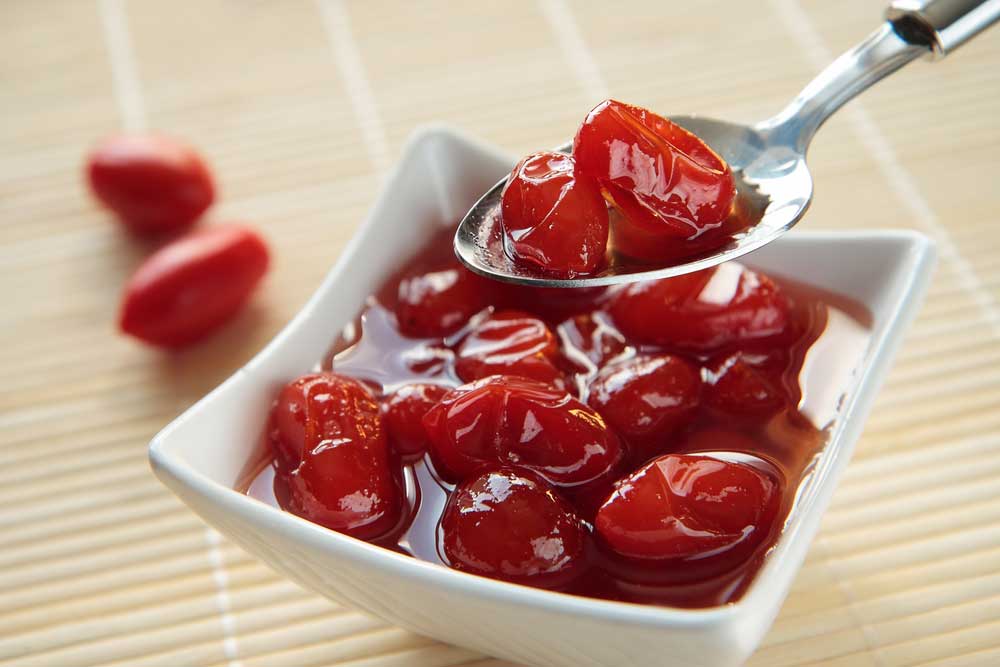Kos Island: Gastronomy and Traditional Recipes
Tradition, culture, foreign influences, and location shape the culinary scene of the “garden of the Aegean.” Kos Island may not be a destination for gourmands, but it is a haven for those who appreciate the simple, honest things in life. The island’s cuisine counts on the quality and flavor of the fresh and organic ingredients farmed on its lands. The island’s emblematic produce are tomatoes, grapes, olives, and honey, each used in recipes passed down in every Koan family for generations.
Must-try Specialities from Kos
Krasotyri
A signature product of Kos, krasotyri (or posa) is sheep’s or goat’s cheese – sometimes a combination of both – matured in brine with red wine. Koans pasteurize the milk before curding it. They then allow the curd to drain in elongated wicker molds before placing the cheese in a mixture of brine and red wine sediment to mature for about 20 to 30 days. Koans devised this process when the island experienced a shortage of olive oil, traditionally used to preserve cheese. Due to the abundance of wine, they created a new method that yielded fantastic results. Today, krasotyri counts as one of the gourmet products you must-try when you visit Kos. Pair the cheese with locally-grown watermelon to elevate its taste.
Glyko Tomataki
Glyko Tomataki – tomato spoon sweet – is a traditional preserve made with fresh tomatoes from the vergaki (the size of cherry tomatoes, but with an elongated shape) varietal, which grows in abundance on Kos Island. The recipe varies slightly from household to household, but the typical end product has hints of honey, almond, and vanilla, which enhance the bursting and acidic flavors of the tomatoes. You can indulge in the taste of this Koan culinary treat when you stay at Astir Odysseus Kos Resort & Spa. Or try to make it at home:
20-25 vergaki (or cherry) tomatoes
1 kg. sugar
20-25 almonds
juice from a lemon
limewater
1 sachet vanilla
Peel the tomatoes, then cut a small hole at the bottom (pedicel) and remove the seeds using a toothpick. Rinse the tomatoes, then let them set in a mixture of limewater and water for 10 minutes. Before starting the cooking process, rinse again well, 3-5 times, and drain. Insert an almond in every tomato.
Place the stuffed tomatoes in a non-stick pan, cover with sugar, and let sit for several hours until the sugar begins to melt – or keep them overnight in the fridge.
Cover the tomatoes with water, then simmer at high heat for about 25 minutes before adding the vanilla and the lemon juice. Simmer five more minutes, then remove from the stove and let the glyko tomataki cool off before serving or placing it in jars for storage.
Kaneláda
A summertime refreshment popular on Kos Island, kaneláda is a syrup, which perfumes the air with its sweet cinnamon and cloves aroma. You can serve the syrup diluted with water or sparkling water, use it to elevate the tang of coffee or spice drinks. If you are not on Kos, you can still enjoy it: just combine water, sugar, cinnamon, and cloves, simmer until the sugar melts, allow it to cool off, bottle it, then refrigerate it. You can learn how to make this sweet libation at home with this recipe from Astir Odysseus Kos Resort & Spa.
Culinary Staples of Koan Cuisine
There are many other Koan specialties you should try when you visit Kos. We have several of them on our menus at Achilles Main Restaurant at Astir Odysseus Kos Resort & Spa.
But when you dine on Kos Island, you should also ask for local wines – Triantafillopoulos and Hatziemmanouil counting among the most popular, but you should try the table wines too.
Honey is another Koan staple, and there are some 50 families on the island contributing some 200 tons to the local economy and exports.
Extra-virgin olive oil is another staple of the Koan cuisine. Treasured by Hippocrates himself, olive oil has uses that go beyond nutrition, in cosmetics, and even healing. Visit an olive oil mill or simply taste it with bread when you have the chance. Extra-virgin olive oil from Kos, bottled in metal canisters, is safe to transport back home when you leave the island. Or, if you want a “lighter” souvenir to elevate your cooking, dry herbs from Kos are also regarded highly for their aroma and quality.

